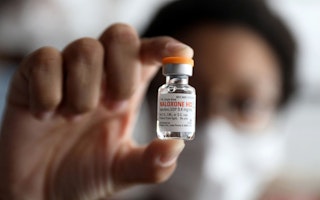Q&A: Preaching Harm Reduction

Providing people who use drugs with life-saving medication is an act of unconditional love, according to Blyth Barnow, a preacher and harm reductionist at Faith in Public Life. Recently, Open Society’s Erin Greenberg spoke with Barnow about her group’s Naloxone Saves tours and how she views harm reduction’s role in the faith community.
Tell us about the origin of the Naloxone Saves tours. Why did you start them, and what have they accomplished?
In 2004 I lost someone I love to an accidental overdose. It was the first in a long string of deaths. Unfortunately, the churches my loved ones were connected to were sources of shame instead of care, leaving people to feel separate from their community and separate from God.
Ten years later I decided to go to seminary to learn how to bury my dead with dignity, because nobody else ever had. But while I was there, I realized I didn’t want to just bury my friends, I wanted to support them in living and living well. Naloxone Saves was born out of this desire. It started as an assignment for a worship class in seminary but has become an opportunity to lift up the sacred lives of people who use drugs and honor their leadership in resurrecting communities.
Through the service, and in partnership with grassroots harm reduction groups, we have distributed thousands of naloxone kits, allowing people to take what they need, no questions asked. But more than that we have corrected the place of people who use drugs in congregations, moving them from the shadows to the altar.
Traditionally, the church has stigmatized drug users and drug use. How are you turning this tradition on its head?
As Christians we are called to cure the sick, raise the dead, cleanse the lepers of our own making, and cast out the demons of shame and stigma. This is harm reduction work. This is the gospel.
For me, they share an obvious connection: unconditional love and a commitment to justice. Harm reduction is not contrary to the Christian faith. Harm reduction calls us to deepen our faith. People who use drugs matter to God. And people who use drugs are doing God’s work. They deserve our respect and support, not our judgement.
How is the pandemic affecting the overdose crisis?
Where I live, in Ohio, we have seen overdose spikes almost every weekend for the first two months of quarantine. Isolation, financial instability, and racist practices in policing and health care continue to drive up our death rates.
This pandemic has also clearly shown us that naloxone is not enough to save our communities. We need housing, living wages, competent health care, and freedom from policing in order to survive both the pandemic and the drug war.
People are struggling to get what they need to live, and we must be comprehensively concerned about that. This includes naloxone, yes; but it also includes freedom from prisons, where COVID is rapidly spreading and many people are being held on immoral and racialized drug charges.
How is Faith in Public Life responding to the pandemic?
Faith In Public Life has been working with faith communities and harm reduction leaders to ensure that people have access to naloxone during this time of increased isolation.
We have also joined a coalition focused on statewide de-carceration efforts. We know that the racist war on drugs has fueled the racist policing that fills racist prisons. It is white supremacy that has fueled an increase of both overdose deaths and deaths from COVID-19 in Black communities. These issues are deeply connected.
As harm reductionists, we have watched millions of dollars pour into police departments in the name of overdose prevention—all while grassroots programs, which are far more effective, have been left to scrape things together, just as they always have. This has left communities vulnerable to the devastating impacts of COVID-19 and increased policing.
When the most effective harm reduction programs rely on an individual paying for supplies out of pocket, it leaves entire communities at risk. What happens when that person loses their job? Or falls ill? Or can’t do outreach because they have a compromised immune system?
Part of how we are responding to the pandemic is by supporting the Movement for Black Lives and by lifting up the demands of local Black leaders. We know that Black lives matter to God and that defunding the police will result in fewer overdose deaths.
Are there any aspects of harm reduction that apply to the pandemic?
This is a time when we must deepen our moral imagination and dream up new possibilities. We must meet people where they are, but we cannot leave them there. We cannot leave our loved ones in prison, we cannot leave our loved ones without housing, we cannot leave our loved ones in isolation.
As harm reductionists we must first meet people where they are and offer the supplies and solidarity that are needed. But we must also join a broader movement to fight for the sanctity and protection of all life by defunding the police and reallocating funds to communities that are desperately in need.
Faith in Public Life is a grantee of the Open Society Foundations.

